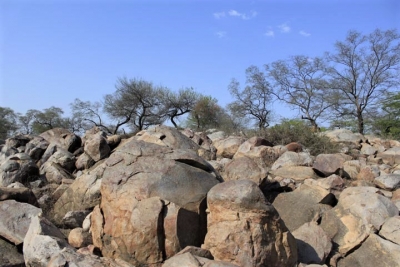Majority of Indians alarmed or concerned about global warming: Report
By IANS | Published: May 4, 2023 10:03 AM2023-05-04T10:03:05+5:302023-05-04T10:20:08+5:30
New Delhi, May 4 Large majorities of Ind are alarmed or concerned about global warming, a new report ...

Majority of Indians alarmed or concerned about global warming: Report
New Delhi, May 4 Large majorities of Ind are alarmed or concerned about global warming, a new report from the Yale Program on Climate Change Communication and CVoter International said on Thursday.
The report, "Global Warming's Four Indias, 2022", identifies four unique audiences within the Indian public that each respond differently to the issue of climate change: The Alarmed, the Concerned, the Cautious, and the Disengaged.
A majority of the Indian population are Alarmed (54 per cent) the group most convinced of the reality and dangers of global warming.
The Concerned (29 per cent) are also convinced global warming is happening and a serious threat but know less about it and view it as a less immediate threat than do the Alarmed.
The Alarmed are the most supportive of political and national action to address global warming and are motivated to take individual action.
The two smaller segments are the Cautious (11 per cent) and Disengaged (7 per cent). The Cautious think global warming is happening but are less certain of the causes and are less likely to view it as a serious, immediate threat that will personally affect them.
They support climate and energy policies but are less supportive of national action and less motivated to take individual action compared with the Alarmed and Concerned.
The Disengaged know very little about global warming, rarely or never engage with the issue, and often say they don't know or provide no response to questions about it.
"One of the first rules of effective communication is to 'know your audience'," said Anthony Leiserowitz, project co-lead at the Yale Program on Climate Change Communication.
"This analysis should help governments, journalists, companies, and advocates better understand and engage their key audiences on the issue of climate change and its solutions."
Global warming risk perceptions differ substantially among the Four Indias. For example, 93 per cent of the Alarmed and 59 per cent of the Concerned, but only 24 per cent of the Cautious and just 1 per cent of the Disengaged think global warming will harm themselves and their family either "a great deal" or "a moderate amount".
The Disengaged are the most likely segment to say they don't know or don't have an opinion.
"Majorities in all four segments have noticed changes in local weather patterns, including rainfall," said Jagadish Thaker, project co-lead at the University of Queensland.
"The report also illustrates how social and economic inequalities increase climate vulnerability among diverse Indian populations."
Responding to the report, Climate Trends director Aarti Khosla told : "India is an extremely climate vulnerable country and it is evident from this study that climate change is no longer perceived as an issue for the distant future, but its ongoing experiences and policy implications are evident to a wide range of the Indian demographic in its current reality.
"The variety of policy support which the four sets of Indian audience have voted for, shows clarity and very high awareness amongst the population on not only understanding the human-induced connections to climate change, but also policy efforts which will lead to positive climate action like the Paris Agreement, less use of fossil fuels, support for India's transition to renewable energy and a national programme for training people in renewable energy jobs, among the other options.
"Clearly climate is no longer a niche issue limited to the elite audience as was always believed. This report is a clear and loud signal for all stakeholders policymakers, businesses and civil society to organise themselves to respond to a population which is demanding urgent and informed climate action."
vg/ksk/
Disclaimer: This post has been auto-published from an agency feed without any modifications to the text and has not been reviewed by an editor
Open in app